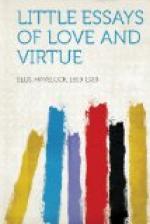It is evident that in the fifteenth century in England there was a wide prevalence of this method of education, which in France, a century later, was still regarded as desirable by Montaigne. His reason for it is worth noting; children should be educated away from home, he remarks, in order to acquire hardness, for the parents will be too tender to them. “It is an opinion accepted by all that it is not right to bring up children in their parents’ laps, for natural love softens and relaxes even the wisest."[2]
[2] Montaigne, Essais, Bk. I., ch. 25.
In old France indeed the conditions seem similar to those in England. The great serio-comic novel of Antoine de la Salle, Petit Jean de Saintre, shows us in detail the education and the adventures, which certainly involved a very early introduction to life, of a page in a great house in the fifteenth century. We must not take everything in this fine comedy too solemnly, but in the fourteenth century Book of the Knight of the Tour-Landry we may be sure that we have at its best the then prevailing view of the relation of a father to his tenderly loved daughters. Of harshness and rigour in the relationship it is not easy to find traces in this lengthy and elaborate book of paternal counsels. But it is clear that the father takes seriously the right of a daughter to govern herself and to decide for herself between right and wrong. It is his object, he tells his girls, “to enable them to govern themselves.” In this task he assumes that they are entitled to full knowledge, and we feel that he is not instructing them in the mysteries of that knowledge; he is taking for granted, in the advice he gives and the stories he tells them, that his “young and small daughters, not, poor things, overburdened with experience,” already possess the most precise knowledge of the intimate facts of life, and that he may tell them, without turning a hair, the most outrageous incidents of debauchery. Life already lies naked before them: that he assumes; he is not imparting knowledge, he is giving good counsel.[3]
[3] If the Knight went to an extreme in his assumption of his daughters’ knowledge, modern fathers often go to the opposite and more foolish extreme of assuming in their daughters an ignorance that would be dangerous even if it really existed. In A Young Girl’s Diary (translated from the German by Eden and Cedar Paul), a work that is highly instructive for parents, and ought to be painful for many, we find the diarist noting at the age of thirteen that she and a girl friend of about the same age overheard the father of one of them—both well brought up and carefully protected, one Catholic and the other Protestant—referring to “those innocent children.” “We did laugh so, WE and innocent children!!! What our fathers really think of us; we innocent!!! At dinner we did not dare look at one another or we should have exploded.” It need scarcely be added that, at the same time, they were more innocent than they knew.




